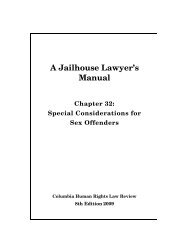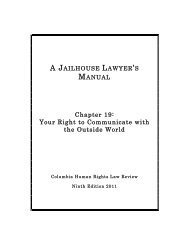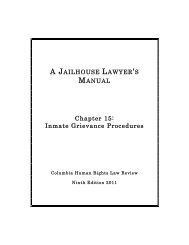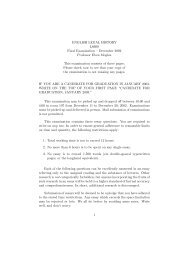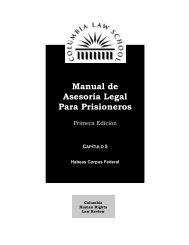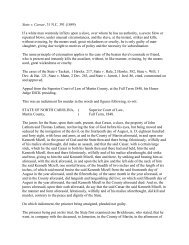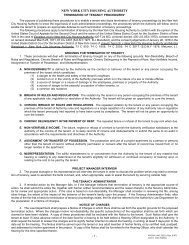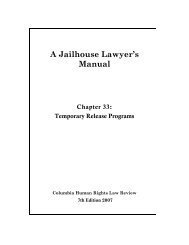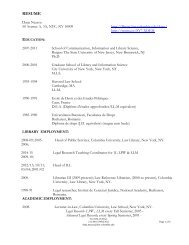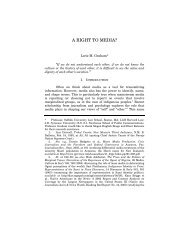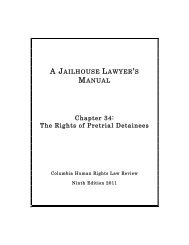The Right to Dignity Rex D. Glensy - Columbia Law School
The Right to Dignity Rex D. Glensy - Columbia Law School
The Right to Dignity Rex D. Glensy - Columbia Law School
Create successful ePaper yourself
Turn your PDF publications into a flip-book with our unique Google optimized e-Paper software.
2011] <strong>The</strong> <strong>Right</strong> <strong>to</strong> <strong>Dignity</strong> 89<br />
enunciate a stable principle, the fact that it is comparatively so rarely<br />
referenced partially negates its intrinsic value and calls in<strong>to</strong> question<br />
whether there actually is a methodological underpinning <strong>to</strong> the<br />
reliance on the right <strong>to</strong> dignity. After all, if the Eighth Amendment<br />
really is the ultimate embodiment of an inherent right <strong>to</strong> dignity,<br />
then why does the Court refer <strong>to</strong> this underlying value so rarely and,<br />
apparently, so randomly? 119<br />
A similar question can be asked pertaining the Fourth<br />
Amendment’s prohibition against unreasonable search and seizure,<br />
seeing that the Court characterized its “overriding function” as being<br />
“<strong>to</strong> protect privacy and dignity against unwarranted intrusion by the<br />
State.” 120 In the Fourth Amendment context, however, the Court’s<br />
explicit reliance upon the dignity rights of the individual is slightly<br />
more frequent. Thus, the Court has readily characterized police<br />
behavior as “offensive <strong>to</strong> human dignity” when it rose <strong>to</strong> the level of<br />
shocking even those of “hardened sensibilities.” 121 Similarly, the<br />
Court found that “the extent of intrusion upon the individual’s<br />
dignitary interests” rendered a search and seizure unconstitutional<br />
when officials forced that individual <strong>to</strong> undergo surgery <strong>to</strong> remove a<br />
is thus “inconsistent with the fundamental premise” of the Eighth Amendment<br />
“that even the vilest criminal remains a human being possessed of common<br />
human dignity.” Gregg v. Georgia, 428 U.S. 153, 230 (1976) (Brennan, J.,<br />
dissenting). See also Roper v. Simmons, 543 U.S. 551, 578 (2005) (holding that the<br />
execution of those who were underage at the time that they committed their crime<br />
was unconstitutional under the Eighth Amendment because that clause rests on<br />
the principles of securing individual freedom and preserving human dignity that<br />
“are central <strong>to</strong> the American experience and remain essential <strong>to</strong> our presentday<br />
selfdefinition and national identity,” and were violated by the laws under<br />
consideration); Skinner v. Oklahoma, 316 U.S. 535, 546 (1942) (Jackson, J.,<br />
concurring) (stating that one could not conduct biological experiments on<br />
convicted criminals because this would come “at the expense of the dignity and<br />
personality and natural powers” of the individuals involved.).<br />
119. Interestingly, Graham v. Florida, which arguably garnered more<br />
attention than any other recent Eighth Amendment case, did not mention dignity,<br />
even though it cited <strong>to</strong> Roper repeatedly <strong>to</strong> support its holding. See Graham v.<br />
Florida, No. 08–7412, 130 S.Ct. 2011 (2011).<br />
120. Schmerber v. California, 384 U.S. 757, 767, 76970 (1966) (“<strong>The</strong><br />
interests in human dignity and privacy which the Fourth Amendment protects<br />
forbid” invasive behavior by the state.). For further discussion of privacy rights,<br />
see Solove, infra note 295.<br />
121. Rochin v. California, 342 U.S. 165, 172, 174 (1952) (ruling<br />
unconstitutionally invasive a search that consisted in opening the petitioner’s<br />
mouth and extracting contents from his s<strong>to</strong>mach).



